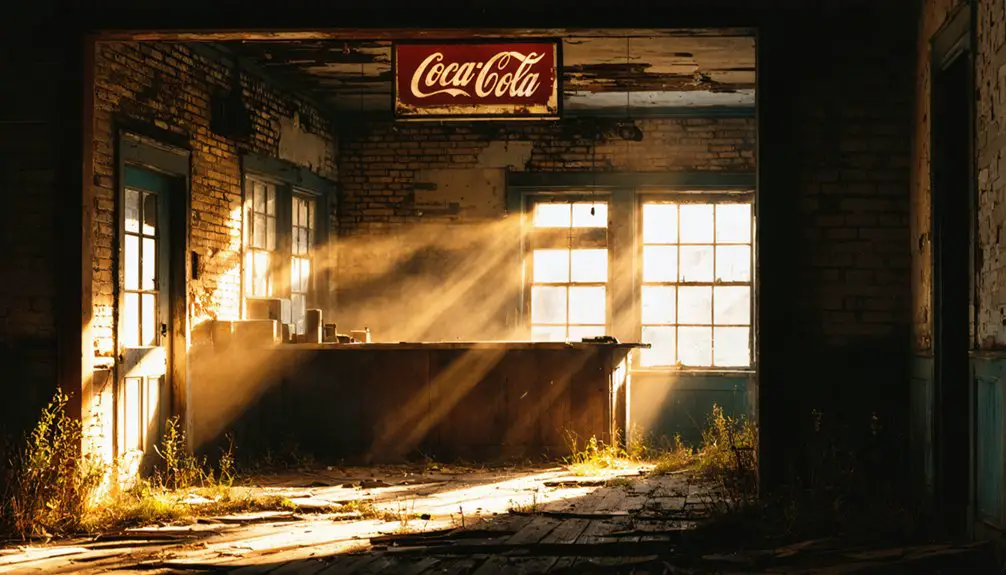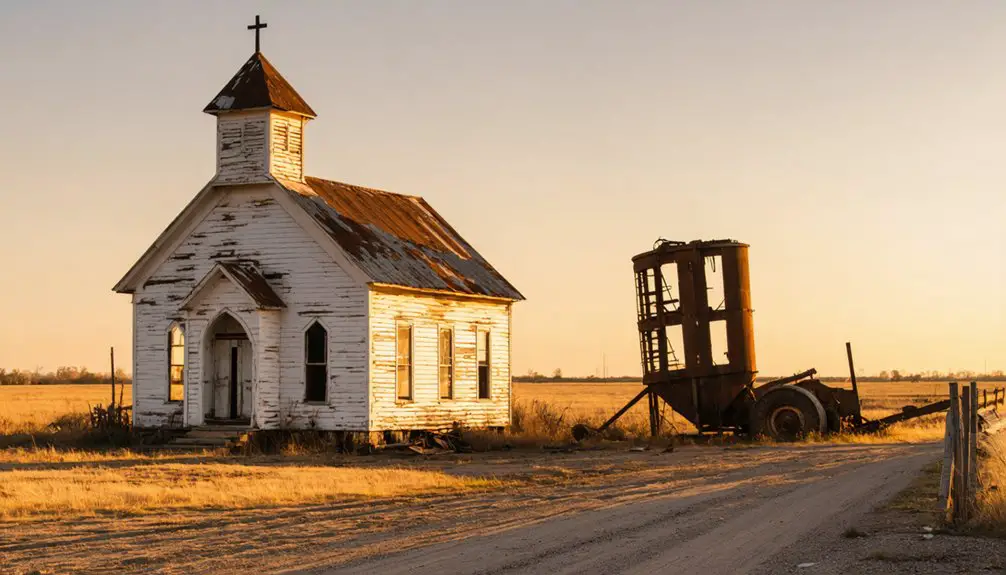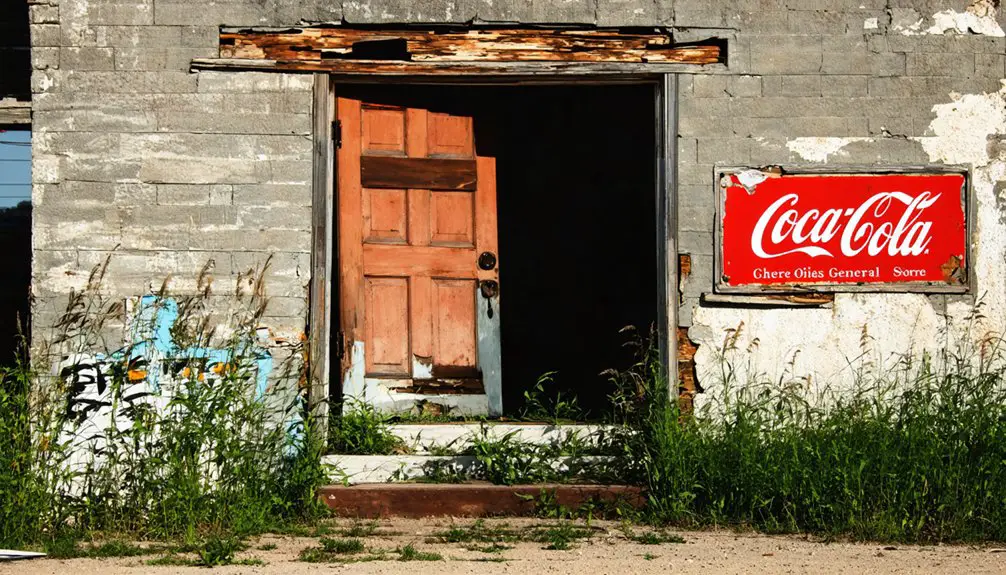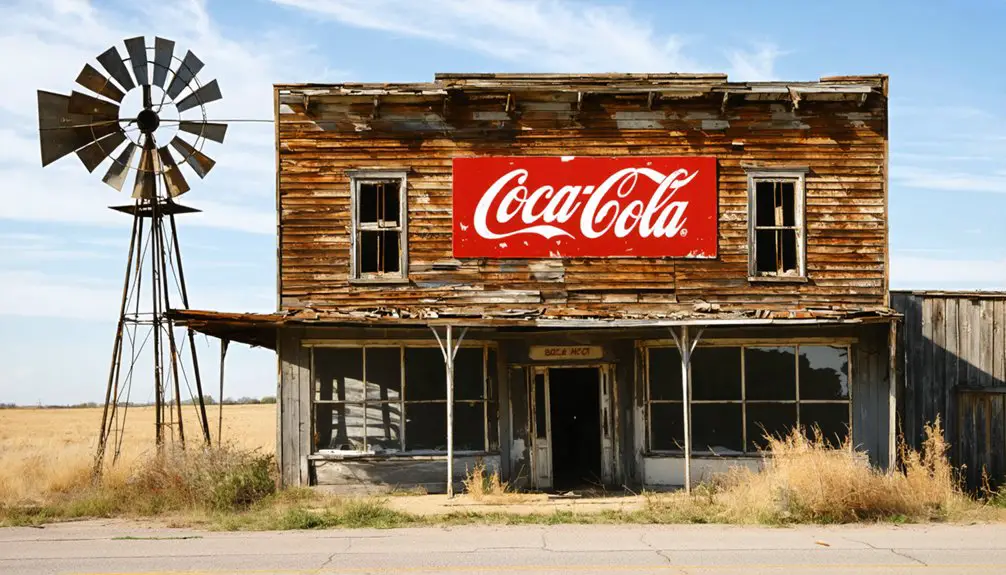You’ll find Micawber’s remnants in Oklahoma’s Okfuskee County, where only its cemetery with 162 memorials remains from this vanished farming settlement. The town flourished in the early 1900s but couldn’t survive the Great Depression‘s brutal impact, when farm income dropped 64% and most tenant farmers lost everything. Today, local volunteers maintain the cemetery’s weathered headstones, which tell rich stories of homesteaders who carved out lives in challenging clay soils before their community disappeared into history.
Key Takeaways
- Micawber was an early Oklahoma settlement that vanished by the 1930s, leaving only its cemetery with 162 memorials as its primary remnant.
- The Great Depression devastated Micawber’s economy, causing farm income to drop 64% and forcing most residents to abandon their land.
- Poor soil conditions, crop failures, and challenging agricultural conditions contributed to Micawber’s decline and eventual ghost town status.
- Micawber Cemetery remains preserved through local volunteer efforts, providing valuable historical records of early homesteaders in the region.
- The town’s population declined below 20% during the Great Depression, with over 60% of tenant farmers losing their homes.
Mapping the Lost Town of Micawber
Several historic maps and physical landmarks help pinpoint the location of Micawber, a vanished Oklahoma settlement that once stood 9 miles northwest of Boley in Okfuskee County.
The area is characterized by its poor farmland that ultimately led to the town’s abandonment.
You’ll find nine detailed maps through PastMaps that reveal old trails, roads, and landmarks perfect for exploring ruins in this remote area. The 1929 Map of Stroud stands as the oldest known map of the region. The mapping significance becomes clear as you navigate the deeply rutted red-clay roads leading to what remains – primarily the renovated Micawber Cemetery.
If you’re planning to explore this ghost town’s site, you’ll want to study these historic resources carefully.
While newer farmhouses now dot the landscape where the town once thrived, the maps can guide you to potential locations of lost infrastructure and help you understand how this rural community was connected to surrounding townships.
Life in Early Okfuskee County
You’d find early Okfuskee County families setting up homesteads wherever they could carve out a living from the challenging clay soil.
The Missouri Territory settlers first explored these lands between 1802 and 1825, seeking opportunities in the untamed wilderness.
Many farmers struggled with the dense earth but learned to work around it by focusing on cotton crops and cattle grazing on the grassy uplands.
Getting goods to market meant relying on rough wagon trails until railroads finally reached the larger towns, though many settlements like Micawber remained isolated.
The area’s growth was largely centered around Creek Nation territory before non-Indian settlement transformed the region in 1902.
Rural Family Settlement Patterns
Life in early Okfuskee County reflected a complex tapestry of settlement patterns, where Creek tribal towns like Thlopthlocco and Greenleaf existed alongside emerging European-American homesteads and African American communities like Boley.
You’d have found settlement dynamics shaped by the rivers and prime farmland, with families choosing spots near water sources to build their homes and work the soil.
Similar to neighboring Okemah, Oklahoma, these rural communities developed around essential gathering places and resources.
Farming remained the economic backbone of these settlements until the discovery of oil and gas in 1914 transformed the local economy.
If you’d visited these rural communities back then, you’d have seen how church and school anchored family life.
The Methodist Episcopal church at Thlopthlocco and Baptist church at Greenleaf weren’t just places of worship – they were the heart of rural traditions.
Folks balanced their cultural heritage while adapting to changing times, especially after the 1898-1906 allotment period transformed communal Creek lands into individual parcels.
Clay Soil Farming Challenges
Early settlers in Okfuskee County quickly discovered that working the region’s stubborn clay soil would test their farming skills and determination.
You’d find yourself battling hard, crusty soil that fought against your plow, while poor drainage meant your crops could drown after a heavy rain. These clay soil conditions forced families to adapt their farming techniques, but crop yields remained frustratingly low.
The soil management challenges didn’t end there. Years of intensive tillage led to severe nutrient depletion by the 1920s, making it even harder to grow cotton, corn, and other staples. Some farmers adopted no-till practices to improve soil health, following methods similar to those later championed by modern agriculturalists like Matt Muller. The Oklahoma Historical Society preserved detailed records of these agricultural struggles through their extensive documentation.
Erosion control became critical as the clay’s poor structure resulted in significant topsoil loss. These agricultural challenges hit farm families hard – the economic impact of reduced harvests and extra labor meant many struggled to make ends meet.
Early Transportation Networks
The original trails crisscrossing Okfuskee County began with Native American tribes who followed ancient animal paths for hunting, trade, and warfare.
You’d find the Black Dog Trail and Osage Trace serving as essential trade routes, with the latter evolving into the Texas Road that connected the Arkansas and Red Rivers.
The transportation evolution really took off when the railroads arrived in the early 1900s. By 1910, six thousand miles of railroad track stretched across Oklahoma.
You could see the dramatic shift as the St. Louis and San Francisco Railway built its north-south line, while the Fort Smith and Western Railroad crossed east-west.
These iron horses transformed places like Boley, Clearview, and Paden into bustling communities.
Before modern roads, pony express riders like Theo Manwarring and Jim Day delivered mail on horseback throughout the region.
Notable Families and Settlers
Several pioneering families formed the backbone of Micawber’s early community, with surnames like Whetstone, Smith, Smalley, Jeffers, and Thorson etched into both local history and cemetery headstones.
You’ll find their settler memories preserved primarily in the Micawber Cemetery, which stands as the last physical evidence to these hardy folk who tried to carve out a living from the challenging soil.
The family heritage of these original settlers, documented in the 1930 census of Creek Township #2, reveals a community of determined farmers who eventually succumbed to the harsh realities of poor farmland, the Dust Bowl, and the Great Depression.
While their descendants have largely moved on, the renovated cemetery continues to tell the story of these resilient families who once called Micawber home.
The Agricultural Struggle
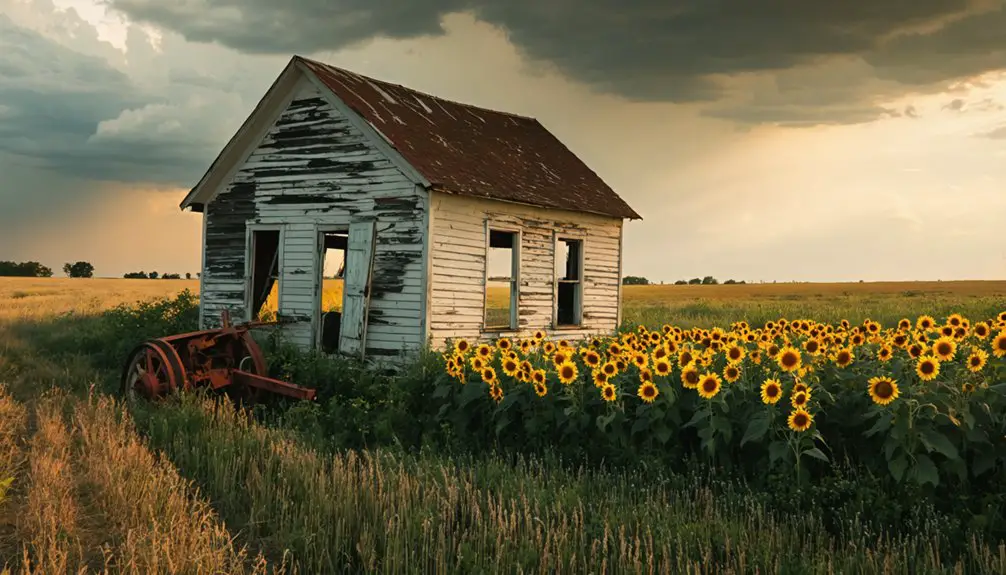
You’ll find the story of Micawber’s farmers marked by their constant battle with poor soil conditions, as tenant farming practices led to widespread soil exhaustion and reduced crop yields.
When you look at the farming patterns of the early 1900s, you’ll notice how the mainly cotton and corn crops struggled through cycles of failure, especially during periods of drought and economic downturn.
The homesteaders who managed to hang on did so by diversifying their crops and maintaining small livestock operations, including cattle and hogs, to supplement their income during tough times.
Soil Quality Challenges
Red clay soil proved to be Micawber’s undoing, as the town’s farming families struggled against nature itself.
You’d find your crops fighting an uphill battle in this stubborn earth, where water wouldn’t sink in properly and nutrients were scarce as gold dust. Without modern soil amendment techniques, those early farmers couldn’t overcome the land’s natural resistance.
The clay’s tendency to compact and erode made matters worse. You could see it in the deeply rutted roads and washed-out fields, where wind and rain carried away precious topsoil.
Even the most determined homesteaders couldn’t win against erosion control problems that plagued their fields. When summer heat baked the ground hard as brick, seedlings struggled to break through the crusted surface, and farming dreams withered alongside stunted crops.
Crop Failure Patterns
Those stubborn clay soils led straight into a pattern of crop failures that would seal Micawber’s fate.
You’ll find that crop resilience was practically non-existent back then, with hot summers and unpredictable rainfall making it near impossible to maintain steady yields.
Tenant challenges were especially brutal – in 1935, more than 75% of Okfuskee County’s 3,520 farms were worked by tenants who couldn’t afford to improve the land they farmed.
- Early 1900s farming focused on sensitive crops like cotton, corn, and potatoes
- By the 1970s, folks tried switching to peanuts and pecans to survive
- The 21st century saw a shift to wheat, corn, oats, and soybeans – crops that could better handle the tough conditions
Those changes came too late for Micawber, though. The town had already vanished by the 1930s.
Homesteader Survival Methods
While Micawber’s settlers faced formidable agricultural challenges, they developed ingenious methods to survive the harsh Oklahoma landscape.
You’d find homesteaders creating strategic tree belts to cut down on water evaporation and protect their precious crops from drying winds. Water conservation became second nature as they built cisterns and maintained wells, ensuring every drop counted.
Food preservation meant the difference between feast and famine. You’d see families drying their garden bounty in the Oklahoma sun, canning their harvest using tested safety methods, and turning fresh milk into long-lasting cheese.
Smart settlers practiced crop rotation and companion planting to keep their soil healthy, while maintaining diverse livestock – from chickens to sheep – provided multiple food sources.
They’d stockpile essentials and learn essential skills like foraging and basic medicine to weather tough times.
Great Depression’s Impact
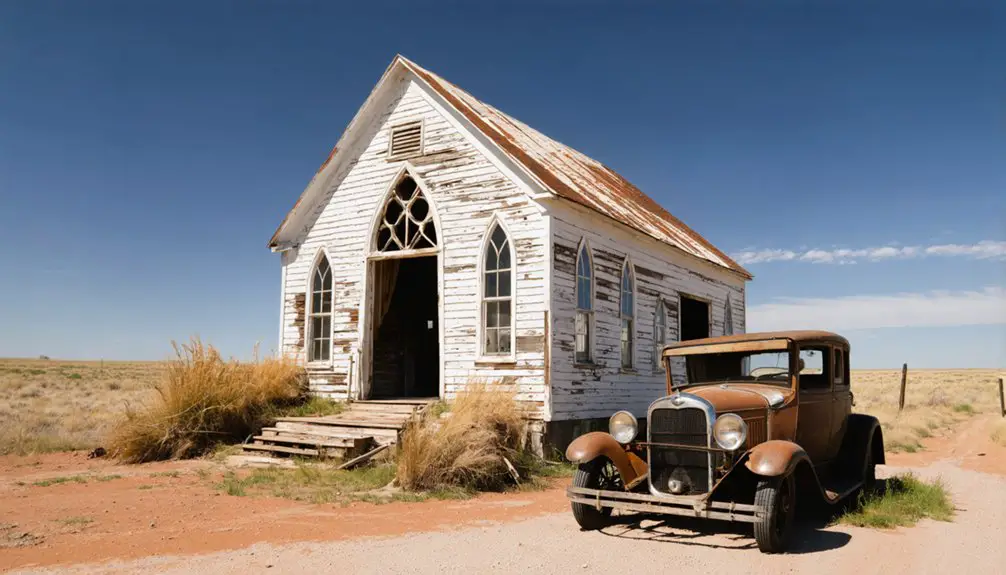
As the devastating effects of the Great Depression swept across Oklahoma in 1930, Micawber’s fate took a grim turn. The town’s economic despair deepened as drought and the East Texas oil glut delivered a crushing one-two punch to local farmers and businesses.
You’d have seen community resilience tested like never before, with over 60% of tenant farmers losing their livelihoods and homes.
- Farm income plummeted by 64%, forcing countless families to abandon their land.
- Without public welfare systems, folks relied solely on charity and makeshift relief efforts.
- The town’s population dropped below the critical 20% threshold, earning Micawber its ghost town status.
Local attempts at survival through charity and benefit events weren’t enough to stem the tide of outmigration, as desperate residents sought opportunities elsewhere.
Legacy Through the Cemetery
Today, Micawber Cemetery stands as the sole physical remnant of this once-thriving Oklahoma community.
You’ll find roughly 162 memorials scattered across adjacent old and new sections, where surnames like Whetstone, Smalley, and Thorson tell the story of early homesteaders.
The cemetery’s significance extends beyond its weathered headstones and field stone markers – it’s a crucial link to your region’s past.
If you’re interested in genealogical research, you’ll discover that recent renovation efforts have preserved these precious historical records.
Though you’ll need to navigate a rutted red clay road to reach it, the cemetery rewards visitors with insights into early 20th-century settlement patterns.
While the surrounding farmland gives little hint of Micawber’s existence, these gravesites keep the town’s memory alive through carefully maintained headstones and family histories.
Accessing the Ghost Town Today
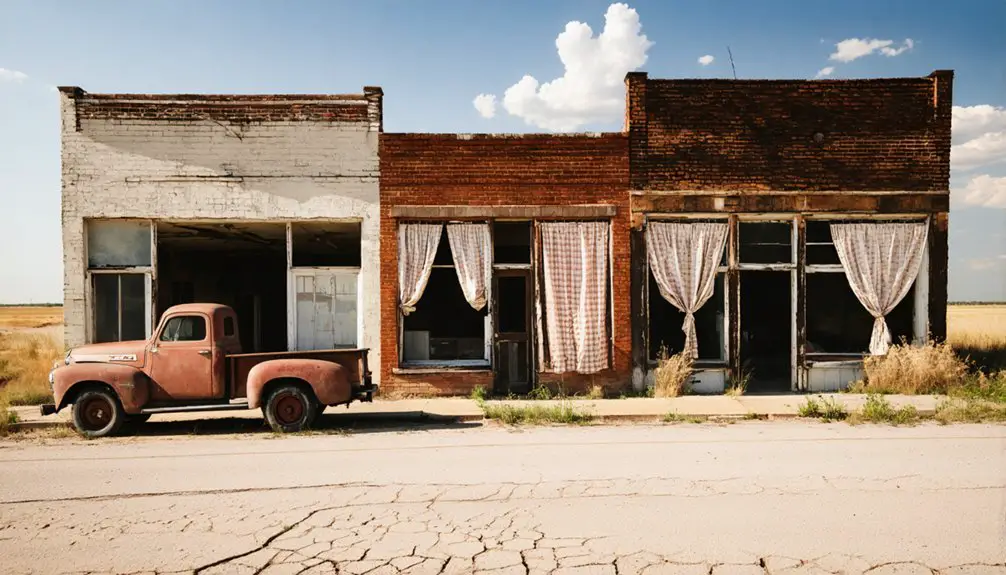
Since reaching Micawber requires careful planning, you’ll need to navigate about 6 miles southeast of Slick on N3220 Road near Little Deep Creek.
The ghost town exploration presents real rural navigation challenges, especially on the red clay dirt roads that can become treacherous when wet. You’ll find the renovated Micawber Cemetery as your main landmark, with several occupied farmhouses nearby marking the general area.
For successful navigation to this remote site:
- Download the nine available historic maps to identify old trails and previous homesites
- Use GPS coordinates (N35 37.471′, W96 30.731′) for precise location tracking
- Time your visit during dry weather, as 2WD vehicles can only access the area when conditions are favorable
Preservation Efforts and Records
While modern explorers focus on finding Micawber’s physical location, dedicated preservation work has centered on the town’s cemetery – the last tangible remnant of this lost community.
You’ll find early settler families like the Whetstones and Mayfields interred here, making it an essential genealogical resource despite challenging access via red-clay dirt roads.
If you’re researching Micawber’s history, you’ll need to piece together information from various archival resources.
The town appears in the 1930 census under Creek Township #2, and local historical societies maintain some records on microfiche.
Records from Creek Township #2 in the 1930 census reveal Micawber’s existence, with additional documentation preserved in local historical archives.
Cemetery renovation efforts have largely been grassroots, with descendants like Jack Whetstone leading the charge.
Local landowners and volunteers continue maintaining the site, proving that preservation doesn’t always require big institutions – just dedicated folks who care about their heritage.
Oklahoma’s Rural Exodus Stories
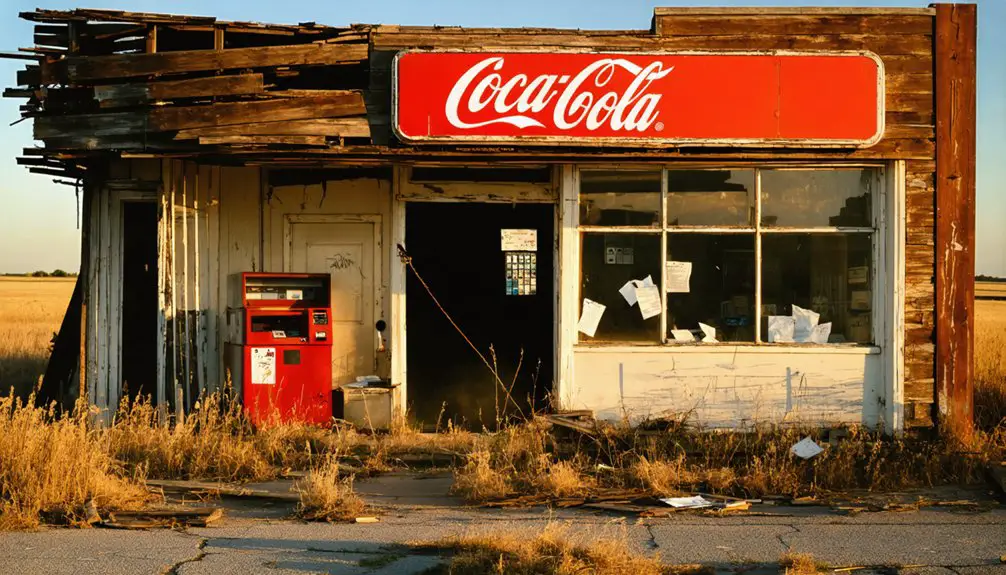
Oklahoma’s rural exodus swept across the state like a relentless storm during the 1930s, displacing over 440,000 residents from their homes and farms.
You’ll find migration narratives woven through every rural community, telling tales of tenant farmers and oil workers who faced impossible choices. Community resilience showed in how folks adapted, often moving between farming and city work before heading west.
- Young adults aged 25-34 led the exodus, seeking opportunities in California and Arizona.
- Southeastern Oklahoma saw more departures than the Dust Bowl regions.
- Displaced urban workers briefly tried subsistence farming before joining the westward migration.
You can trace these patterns through generations, as working-age residents continued leaving, leaving behind aging populations and quieter towns.
Frequently Asked Questions
Was Micawber Named After Charles Dickens’ Character Mr. Micawber?
Like a faded photograph, you’ll find Micawber’s origins aren’t clear cut. You can’t confirm any Dickens influence on the town’s name since historical records don’t show proof of a connection to Mr. Micawber.
Did Any Native American Tribes Occupy the Micawber Area Before Settlement?
You’ll find rich tribal history there, with Wichita bands like the Taovayas and Tawakonis calling it home first. Native American groups including Kiowa, Comanche, and Apache later controlled this territory too.
What Happened to the Town’s Original Buildings and Structures?
You’ll find those abandoned structures fell victim to Mother Nature’s fury, scavengers who stripped materials, and vandals who destroyed what remained. Sadly, there wasn’t much historical preservation to save them.
Were There Any Schools or Churches Established in Micawber?
You won’t find any school history or church influence in the records – there’s no evidence that either was ever built there. Folks likely shared institutions with nearby townships instead.
Did Any Significant Crimes or Incidents Occur in Micawber’s History?
You won’t find any notable crimes or dramatic incidents in the historical records. The town’s crime history was unremarkable, and it faded away quietly due to poor farming conditions.
References
- https://www.ghosttowns.com/states/ok/micawber.html
- https://www.youtube.com/watch?v=5d-wHDTIbb0
- https://en.wikipedia.org/wiki/List_of_ghost_towns_in_Oklahoma
- https://www.youtube.com/watch?v=-jYN1_E2VV0
- https://www.youtube.com/watch?v=zTKa5i1czdE
- https://pastmaps.com/explore/us/oklahoma/okfuskee-county/micawber/hiking-exploration
- https://www.youtube.com/watch?v=2Umqz7LrpyE
- https://therockerbox.com/okfuskee_county_ok_ghost_towns.htm
- https://www.okhistory.org/publications/enc/entry?entry=OK004
- https://sites.rootsweb.com/~okokfusk/
